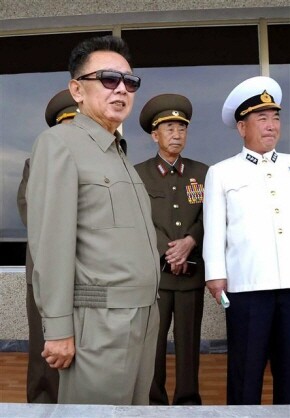hankyoreh
Links to other country sites 다른 나라 사이트 링크
North Korea modifies its Constitution to reflect Kim Jong-il system

It was confirmed Monday that North Korea had modified its Constitution during the first session of the 12th Supreme People’s Assembly on April 9 by strengthening the position, duties and authority of the chairman of the National Defense Commission by designating him as the country’s supreme leader and adding the Songun (Army First) ideology to North Korea’s existing ruling ideology of Juche. In particular analysts believe this constitutional reform, the first in 11 years, has given constitutional status and hence systematized the existing Songun Politics and Songun Revolutionary Line centered on the National Defense Commission and its Commissioner, Kim Jong-il. This ninth reform of the North Korean Constitution, modifies the existing constitution of seven chapters and 166 articles that was put in place Sept. 1998 into a new constitution consisting of seven chapters and 172 articles.
A government institution familiar with the situation in North Korea said the text of the new North Korean constitution, which was released to the press today, added new articles, including, “Commissioner of the National Defense Commission is the supreme leader of the DPRK” (Article 100), and specifies that the commissioner as supreme commander controls all of North Korea’s armed forces (Article 102). Moreover, it clarifies the duties and authorities of the National Defense Commissioner, which were left vague in the 1998 constitution, to include leadership over the general business of the nation, the ratification and abolition of major treaties with other nations, and the authority to issue mobilization orders in times of national emergency or war. In the existing constitution, the authority to ratify and abolish treaties was given to the Supreme People’s Assembly and the authority to issue mobilization orders was given to the National Defense Commission.
The reformed constitution also includes a new article designating the National Defense Commission as a body that creates major national policy for the achievement of the Songun revolutionary line, and holds it responsible for creating and overseeing major national policy as a national institution under its Commissioner. The constitution also clarifies that the National Defense Commission overseas execution of commissioner’s orders and commission’s decisions, and that it can abolish the decisions and directives of national institutions that run counter to them. In the existing constitution, the power to abolish decisions and directives that run counter to National Defense Commission’s decisions rests with the standing committee of the Supreme People’s Assembly.
Observers suggest since the constitutional authority of the National Defense Commission and its commissioner has been strengthened to reflect reality, the authority of the Supreme People’s Assembly and its standing committee has been reduced.
In addition, by adding the Songun ideology to the existing Juche ideology as the ruling guideline of the country in the Constitutional reform, analysts suggest North Kim Jong-il’s Songun ideology is now on equal footing with the late Kim Il-sung’s Juche ideology. In addition, by completely erasing the term “communism,” which appeared three times in the existing constitution, the new constitution also reveals the intention to concentrate on the construction of a “North Korean-style socialism.” This is evident in the expressed goal of education, which has been changed from the cultivation of a “new communist man” to the cultivation of a new Juche-style man.
Meanwhile, analysts say North Korea has not revealed any eye-catching changes in articles pertaining to the country’s economic order. This runs counter to the predictions of experts, who have been saying there would be changes to economy-related articles in reference to the “July 1 Economic Management Reform Measures,” the spread of markets and inter-Korean economic cooperation. A South Korean government official says the constitutional changes reflect the reality of the Kim Jong-il system.
Please direct questions or comments to [englishhani@hani.co.kr]
Editorial・opinion
![[Column] Season 2 of special prosecutor probe may be coming to Korea soon [Column] Season 2 of special prosecutor probe may be coming to Korea soon](https://flexible.img.hani.co.kr/flexible/normal/500/300/imgdb/original/2024/0426/3317141030699447.jpg) [Column] Season 2 of special prosecutor probe may be coming to Korea soon
[Column] Season 2 of special prosecutor probe may be coming to Korea soon![[Column] Park Geun-hye déjà vu in Yoon Suk-yeol [Column] Park Geun-hye déjà vu in Yoon Suk-yeol](https://flexible.img.hani.co.kr/flexible/normal/500/300/imgdb/original/2024/0424/651713945113788.jpg) [Column] Park Geun-hye déjà vu in Yoon Suk-yeol
[Column] Park Geun-hye déjà vu in Yoon Suk-yeol- [Editorial] New weight of N. Korea’s nuclear threats makes dialogue all the more urgent
- [Guest essay] The real reason Korea’s new right wants to dub Rhee a founding father
- [Column] ‘Choson’: Is it time we start referring to N. Korea in its own terms?
- [Editorial] Japan’s rewriting of history with Korea has gone too far
- [Column] The president’s questionable capacity for dialogue
- [Column] Are chaebol firms just pizza pies for families to divvy up as they please?
- [Column] Has Korea, too, crossed the Rubicon on China?
- [Correspondent’s column] In Japan’s alliance with US, echoes of its past alliances with UK
Most viewed articles
- 1‘We must say no’: Seoul defense chief on Korean, USFK involvement in hypothetical Taiwan crisis
- 2After election rout, Yoon’s left with 3 choices for dealing with the opposition
- 3Why Kim Jong-un is scrapping the term ‘Day of the Sun’ and toning down fanfare for predecessors
- 4AI is catching up with humans at a ‘shocking’ rate
- 5Noting shared ‘values,’ Korea hints at passport-free travel with Japan
- 6[Editorial] Korea’s surprise Q1 growth requires objective assessment, not blind fanfare
- 7Two factors that’ll decide if Korea’s economy keeps on its upward trend
- 8Yoon says collective action by doctors ‘shakes foundations of liberty and rule of law’
- 9Amnesty notes ‘erosion’ of freedom of expression in Korea in annual human rights report
- 10South Korea a veritable tax break paradise for chaebol